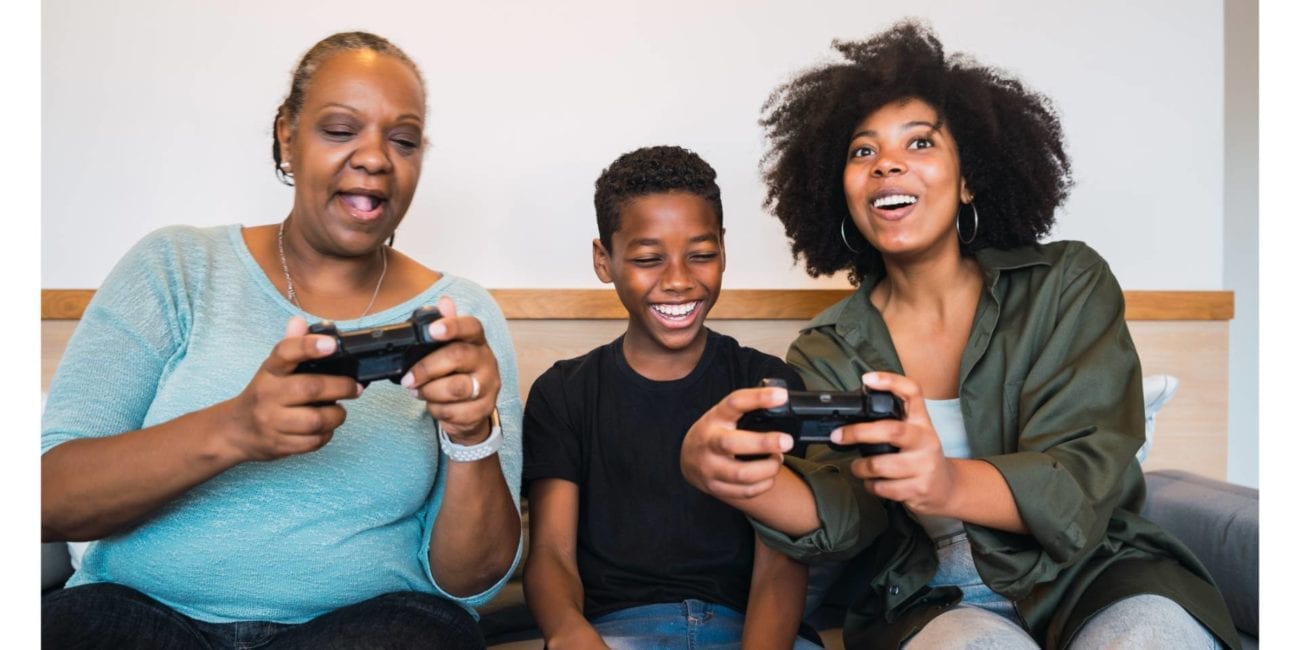Family memories are easily formed over a deck of cards or game board. The great thing about games is that they can be played anywhere, including home, a coffee shop, or even in a doctor’s waiting room. Our parents don’t stop enjoying games just because they are getting older; break out the chess board or dominos and get to work!
Being at home more often is something that naturally happens as our parent ages. Whether it’s retirement or mobility issues that keeps them homebound, we can support our aging parents by spending quality time with them (and maybe letting them win a round of checkers).

Entertaining a Loved One
As busy as we are as caregivers, it’s tough to make time for our loved one to have more fun. Creating a safe and comfortable living environment is the top priority, but nurturing our loved one’s needs for fun and entertainment is a perfect next step.
A top way to entertain is through games. For many aging Americans, games are familiar and even nostalgic. Many seniors have fond memories of playing games in their past, and it is a great pastime to re-introduce.
Recreating some of that culture in their home will bring great joy to a loved one’s life, and help them connect to other generations.

The Benefits of Games for Aging Adults
Not only are games a great source of entertainment, but they have significant benefits for aging adults.
First, games can often provide social benefits to our loved ones. Whether played in-person as a group or online, games usually involve connecting with other people. When seniors struggle with isolation and loneliness in their golden years, games can add that element of sociability that they are looking for.
Second, many games help activate the brain, supporting our older parents memory and cognitive function. Medical professionals encourage games to continue to strengthen brain pathways or even increase physical health. Meanwhile, our parents are simply having a fun time!

What are Good Memory Games for Seniors?
A common use of games among seniors is to help support their cognition and memory. Just like how working out builds physical muscle, our loved ones can strengthen their brain “muscles” through games! Specifically, many families use games to support the elderly with dementia and Alzheimer’s disease. Below is a list of various brain games for seniors:
- Memory card games
- Word games for seniors, like Scrabble, crossword puzzles, and word-searches
- Chess
- Alphabet or I-spy games that can be played out-loud
- Jigsaw puzzles
- Object classification games (placing objects in order of size, categorizing by color, etc.) These games are beneficial for loved ones with dementia.

Fun Active Games for the Elderly
Along with all the cognitive benefits that come with games, there can also be great physical benefits for your aging parent. Movement is important at all ages in life, but it gets tougher as you age. Be sure to think about what movements are most appropriate; ask your parents what feels good and what doesn’t, and adjust accordingly.
One of the best strategies for including exercise games in a parent’s daily life is to consider what activities they might already enjoy (or did earlier in life). For instance, more traditional games like horseshoes may be a nostalgic activity they enjoy without realizing how much they are moving. Below are a few fun exercise games to play with your elderly parent:
- Shuffleboard
- Horseshoes or light ring toss
- Croquet or bocce ball
- Water balloon toss
- Beanbag toss or cornhole
- Competitions while walking (e.g., who can count the most strollers on their walk? Or I-spy games)
- Getting to splash around during pool games with the family (like Marco Polo or red-light, green-light)

Gaming Through Technology
While gathering as a family to play a game is ideal, I know that it’s not always possible. From health needs or time constraints, sometimes our loved ones might have to find ways to have fun on their own. Thankfully, technology can help.
Many of our parents favorite games already exist on a virtual platform. Classic card, word, and board games are easily downloaded to a smartphone or tablet. They might need some help in downloading these games and learning the interface but once they are set up they won’t need much handholding.
There are puzzle and game subscriptions targeted at seniors to help encourage daily brain function. Many aging organizations like AARP provide daily online games that can be played through a simple web browser and don’t require any setup.
Many of these games can be played by multiple people remotely. So, a family could be sitting at home while still engaging with grandma across the country by playing a multiplayer trivia game. This offers our loved ones the social benefits of gaming when being nearby is not an option.
Through technology, we can find fun games to play with your elderly parent wherever they are!

Supporting Families that Play Together
First, learn about what games your loved one enjoys or maybe even activities that were a key part of their life in the past. Next, consider ways to incorporate those games into your everyday lives. Feel free to share your ideas for fun games on our community page at Facebook.com/groups/beverlysdaughter




Leave a Reply